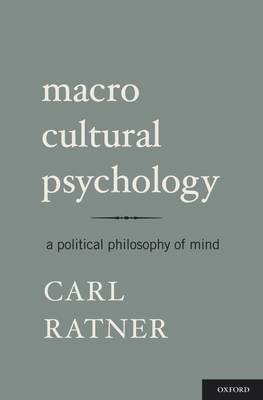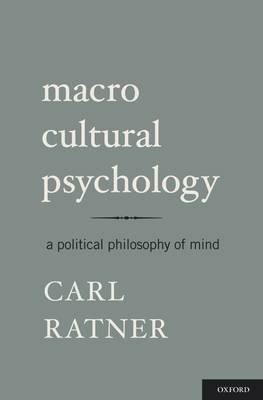
- Retrait gratuit dans votre magasin Club
- 7.000.000 titres dans notre catalogue
- Payer en toute sécurité
- Toujours un magasin près de chez vous
- Retrait gratuit dans votre magasin Club
- 7.000.0000 titres dans notre catalogue
- Payer en toute sécurité
- Toujours un magasin près de chez vous
193,45 €
+ 386 points
Description
This book articulates a bold, new, systematic theory of psychology, culture, and their interrelation. It explains how macro cultural factors -- social institutions, cultural artifacts, and cultural concepts -- are the cornerstones of society and how they form the origins and characteristics of psychological phenomena. This theory is used to explain the diversity of psychological phenomena such as emotions, self, intelligence, sexuality, memory, reasoning, perception, developmental processes, and mental illness. Ratner draws upon Lev Vygotsky's sociocultural psychology, Bronfenbrenner's ecological psychology, as well as work in sociology, anthropology, history, and geography, to explore the political implications and assumptions of psychological theories regarding social policy and reform. The theory outlined here addresses current theoretical and political issues such as agency, realism, objectivity, subjectivism, structuralism, postmodernism, and multiculturalism. In this sense, the book articulates a systematic political philosophy of mind to examine numerous approaches to psychology, including indigenous psychology, cross-cultural psychology, activity theory, discourse analysis, mainstream psychology, and evolutionary psychology.
Spécifications
Parties prenantes
- Auteur(s) :
- Editeur:
Contenu
- Nombre de pages :
- 544
- Langue:
- Anglais
Caractéristiques
- EAN:
- 9780195373547
- Date de parution :
- 05-09-11
- Format:
- Livre relié
- Format numérique:
- Genaaid
- Dimensions :
- 160 mm x 236 mm
- Poids :
- 839 g

Les avis
Nous publions uniquement les avis qui respectent les conditions requises. Consultez nos conditions pour les avis.






